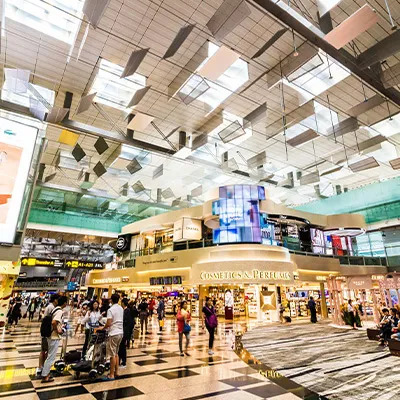Singapore is working closely with six other nations to tackle disruptions to trade and supply chains that could impede the delivery of vital goods, including food and medicine.
Singapore and its partners in the initiative - Australia, Canada, Chile, New Zealand, Myanmar and Brunei - pledged that they will ensure trade lines for land, air and sea freight remain open.
They are also open to cooperation from other nations, said Singapore's Trade and Industry Minister Chan Chun Sing in a Facebook post yesterday.
The initiative comes amid signs that the US$20 trillion (S$29 trillion) global trade sector is grinding to a halt in the wake of lockdowns, travel curbs, port quarantines and border controls imposed to contain the spread of the Covid-19 disease.
"We recognise that it is in our mutual interest to ensure that trade lines remain open," the countries said in a joint statement issued by Singapore's Ministry of Trade and Industry (MTI).
"We are committed to working with all like-minded countries to ensure that trade continues to flow unimpeded, and that critical infrastructure such as our air and seaports remains open to support the viability and integrity of supply chains globally."
Though food is in plentiful supply across the world, logistical hurdles are making it harder to get products to where they are needed.
Four of the nations that inked the joint statement - Australia, Canada, New Zealand and Chile - are among the world's top food exporters with shipments that include grains, pulses, meat, seafood and dairy.
While China's extreme measures to stop the spread of the virus are now allowing its economy to slowly come back online, supply chains are disintegrating in other parts of the world and threatening the availability of essential products.
An MTI spokesman noted a sharp drop in airfreight capacity in the wake of flight cancellations and reduced connectivity.
Airfreight charges have correspondingly become volatile and have risen several times while some seaports have had restrictions imposed, including suspension of port operations.
There have also been disruptions to land transport because of enhanced border controls.
For instance, the production of medical equipment often involves supply chains that straddle multiple countries.
That means nations must ensure that components and raw materials can flow unimpeded and efficiently.
Mr Chan said: "Countries must band together and unite in this fight against the virus instead of making decisions that threaten global trade.
"As a country that prides itself on its openness and strong connectivity, Singapore is committed to bringing like-minded partners together to uphold trade and supply chain connectivity, and will continue to lead efforts in this area."
Stockpiling and panic buying by consumers are also adding to supply strains.
Retailers from across the world have reported panic buying and hoarding of medications, putting at risk the supply of vital drugs to vulnerable patients.
In the United States, the stockpiling has prompted pharmaceutical boards in Idaho, Kentucky, Ohio, Nevada, Oklahoma, North Carolina and Texas to issue restrictions or guidelines on drug sales.
Food hoarding is also becoming commonplace.
Even some governments are moving to secure domestic food supplies.
For instance, Kazakhstan, one of the world's biggest shippers of wheat flour, has banned exports of the product along with carrots, sugar and potatoes, among other products.
Serbia has stopped the flow of its sunflower oil and other goods, and Russia is leaving the door open to shipment bans.
Other nations are adding to their strategic food reserves.
China, the biggest rice grower and consumer, pledged to buy more than ever before from its domestic harvest, even though the government already holds massive stockpiles of rice and wheat, enough for one year of consumption.
"The decisions that are made today will have a lasting effect on the global economy when the situation stabilises," said Mr Chan in his post.
"While the short-term challenges are real and severe, as responsible governments, we must continue to keep an eye on the future and what it will bring for our businesses and people after the virus has been defeated."
Copyright © 2020 Singapore Press Holdings
This article was written by Ovais Subhani from The Straits Times and was legally licensed through the NewsCred publisher network. Please direct all licensing questions to legal@newscred.com.






